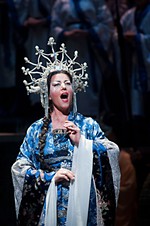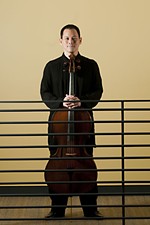'Sweet Land of Liberty'
The musical melting pot from new U.S. citizen Michelle Schumann was sweet indeed
Reviewed by Michael Kellerman, Fri., April 23, 2010
'Sweet Land of Liberty'
Private home
April 16
For the last opus of the Austin Chamber Music Center season, Artistic Director Michelle Schumann focused on a personal journey: her imminent passage into American citizenship.
In her opening remarks, Schumann quizzed the audience with questions from the citizenship test. To be polite, let's just say that collectively, we didn't exactly pass with flying colors.
To celebrate the occasion, Schumann brought in two artists new to the center, violinist Tereza Stanislav and cellist Clancy Newman, and together they presented an all-American program that drew influences from across our vast cultural landscape.
First up was the Piano Trio by Amy Beach, one of our nation's first successful female composers. Weaving elements of Eskimo melody into her dense, chromatic style, Beach's Trio was a gorgeous piece, offering pensive subtlety one moment and playful gusto the next. The performers got off to a rocky start, taking some time to settle into the dense, fluvial texture of the opening movement, before moving on for the yearning "Lento" and the Inuit-inspired "Allegro con brio."
It took me some time to come up with a way to do justice to Paul Schoenfield's compositional style. Here goes: Almost schizophrenic in its layering of texture and mood, Schoenfield's Café Music is a bit like taking a three-hour jazz-era Broadway musical and squeezing it, frantically, into a 15-minute chamber piece – but in a good way. It was indeed an inspiring spectacle.
Described by the composer himself as "high-class dinner music," the piece opened with a rollicking "Allegro" ode to the Great White Way. Schumann was sensational throughout, nailing the near-constant pivots in meter and style while making it all seem like effortless fun.
The pace slowed temporarily for the "Rubato," whose Hasidic melodic influences created a haunting, soulful environment that was capsized by the first notes of the final "Presto" movement, a saloon-inspired romp. Much like watching an old silent Western film in fast motion, the movement showcased the brave, interactive virtuosity of Stanislav and Newman. As the audience whooped and hollered afterward, I thought, "I gotta listen to more Paul Schoenfield."
Intermission was followed by the piano trio Poets and Prophets by composer and six-time Country Music Association Musician of the Year Mark O'Connor. Fraught with grief after the death of Johnny Cash, O'Connor sought to commemorate his idol with the four-movement meld of country music and classical form.
Echoing the spare drive of Cash's songs, O'Connor's uncrowded, Copland-like sonority befitted the setting. Following the dense material in the first act, the piece offered many contemplative, open moments, as in the sweet section "My June" and the loose strumming of "The Tennessee Two." In the final movement, "Hello, I'm Johnny Cash," O'Connor did justice to legacy, offering a bombastic, dance-hall finale. The players, all three in full jack-of-all-trades glory, brought the house down.
It's fitting that Schumann presented this musical melting pot for her celebration of the American way. Long ago adopted as an honorary Austinite and soon free to participate in the dual joys of voting and jury duty, Schumann can thus continue to lead the Austin Chamber Music Center in what it does best: pluck inspiration from all corners of the world around us and whip it into a musical feast. How sweet it is.











